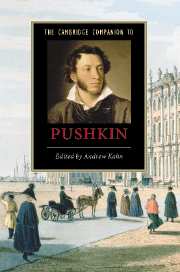Book contents
- Frontmatter
- Introduction
- Part I Texts and Contexts
- 1 Pushkin’s life
- 2 Pushkin’s lyric identities
- 3 Evgenii Onegin
- 4 Pushkin’s drama
- 5 Pushkin’s long poems and the epic impulse
- 6 Prose fiction
- 7 Pushkin and politics
- 8 Pushkin and history
- 9 Pushkin and the art of the letter
- 10 Pushkin and literary criticism
- Part II The Pushkinian tradition
- Appendix on verse-forms
- Guide to further reading
- Index
5 - Pushkin’s long poems and the epic impulse
from Part I - Texts and Contexts
Published online by Cambridge University Press: 28 March 2007
- Frontmatter
- Introduction
- Part I Texts and Contexts
- 1 Pushkin’s life
- 2 Pushkin’s lyric identities
- 3 Evgenii Onegin
- 4 Pushkin’s drama
- 5 Pushkin’s long poems and the epic impulse
- 6 Prose fiction
- 7 Pushkin and politics
- 8 Pushkin and history
- 9 Pushkin and the art of the letter
- 10 Pushkin and literary criticism
- Part II The Pushkinian tradition
- Appendix on verse-forms
- Guide to further reading
- Index
Summary
In Russian, the long poem (poema) is generally defined as an extended verse narrative in contrast to the shorter and less plot-oriented lyric (stikhotvorenie). Like all genre classifications, the term has its limitations. The long poem need not be antithetical to the lyric (indeed, lyric insertions are frequent), and some forms of the lyric can be dependent on plot. Such ambiguities notwithstanding, Pushkin himself used the term, and it has become traditional in editions of his work. Pushkin turned to the long poem throughout his career, completing ten and leaving substantial fragments of others. The present chapter focuses on Ruslan and Liudmila (Ruslan i Liudmila, 1818- 20), The Gypsies (Tsygany, 1824) and The Bronze Horseman (Mednyi vsadnik, 1833).
Epic and mock-epic (Ruslan and Liudmila)
Epic and mock-epic (Ruslan and Liudmila): To the end of his life, Pushkin was as much a product of the Russian eighteenth century as he was of contemporary European Romanticism. Russia’s eighteenth-century poets had established a hierarchy of genres, each of which demanded a specific style and vocabulary. At the pinnacle was the epic (poema), for the creation of a national epic was deemed the ideal means of ‘legitimising’ both the country and its nascent literary tradition. In practice, however, the eighteenth-century poets had far less success with the epic than with the solemn ode (torzhestvennaia oda), a relatively lengthy and formally strict poem commemorating events of national significance (battles and court festivities).
- Type
- Chapter
- Information
- The Cambridge Companion to Pushkin , pp. 75 - 89Publisher: Cambridge University PressPrint publication year: 2006

